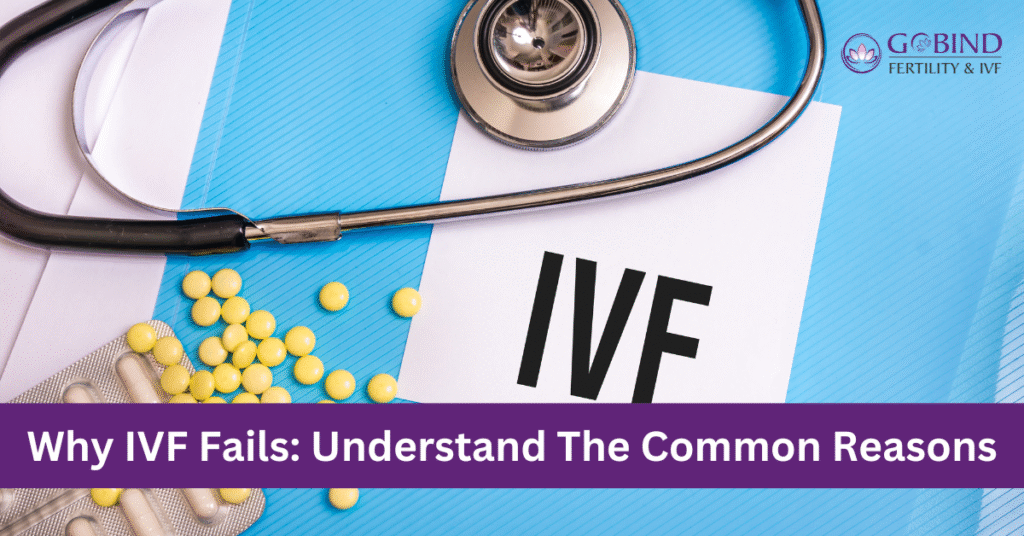Why IVF Fails: Understanding the Common Reasons

Introduction
In vitro fertilisation (IVF) is a ray of hope for couples struggling with infertility. It offers a scientific and highly effective way to achieve pregnancy, especially when other methods fail. However, despite technological advancements, IVF does not guarantee success. Many couples are devastated when their IVF cycle doesn’t result in a pregnancy, especially when everything appears to be going well.
At Gobind Fertility & IVF Centre, we believe in transparent communication, scientific diagnosis, and emotional support throughout your fertility journey. In this article, we’ll uncover the most common reasons why IVF fails, what factors influence success, and how you can improve your chances in future cycles.
What is IVF?
IVF, or In-Vitro Fertilisation, is an assisted reproductive technology (ART) where eggs are retrieved from the ovaries, fertilised with sperm in a laboratory, and the resulting embryo is transferred into the uterus.
The goal is simple: a successful implantation leading to a healthy pregnancy. But the process involves several complex stages, and any problem in these steps can cause the IVF cycle to fail.
Common Reasons Why IVF Fails
1. Poor Egg Quality
Even with normal ovarian reserve, the quality of eggs plays a crucial role in embryo development. Poor egg quality may lead to:
- Failed fertilization
- Genetically abnormal embryos
- Implantation failure
- Early miscarriage
Egg quality naturally declines with age, but in some women, even younger ones, poor egg quality can exist due to genetics or hormonal issues.
2. Poor Sperm Quality
Sperm count, motility, and morphology are commonly tested before IVF. However, sperm DNA fragmentation—often not visible in standard semen analysis—can also hinder embryo development.
3. Embryo Quality Issues
Not all embryos are capable of implantation. A healthy-looking embryo may still have chromosomal abnormalities that prevent it from attaching to the uterine lining.
- Day 3 or Day 5 embryos may look normal under the microscope, but fail to grow further
- Embryos with genetic defects may lead to implantation failure or miscarriage
Preimplantation Genetic Testing (PGT) can help identify genetically normal embryos for transfer.
4. Implantation Failure
Implantation is a complex process that requires perfect coordination between a healthy embryo and a receptive endometrium (uterine lining). Even a top-quality embryo can fail to implant due to:
- Thin endometrial lining
- Infections in the uterus
- Unexplained uterine inflammation
- Immune-related disorders
5. Age of the Woman
Age is one of the most significant predictors of IVF success. Women over 35 may have:
- Fewer antral follicles
- Lower AMH levels
- Higher chance of chromosomal abnormalities in eggs
At Gobind Fertility & IVF Centre, we use ovarian reserve testing and personalised stimulation protocols to optimise outcomes in advanced maternal age.
6. Uterine Abnormalities
Sometimes, IVF failure is due to problems in the uterus that prevent embryo implantation or growth, such as:
- Uterine fibroids or polyps
- Scar tissue (Asherman’s syndrome)
- Congenital abnormalities (septate uterus)
7. Lifestyle Factors
Certain lifestyle habits can negatively impact IVF success, including:
- Smoking and alcohol consumption
- Obesity or being underweight
- High stress levels
- Lack of proper nutrition
At Gobind Fertility, we emphasise pre-IVF counselling, lifestyle modification, and dietary guidance.
8. Hormonal Imbalances
IVF requires a controlled hormonal environment. If hormone levels are not optimal during ovulation stimulation or the luteal phase, IVF may not succeed.
Common hormone-related issues include:
- Elevated prolactin levels
- Thyroid dysfunction
- PCOS (Polycystic Ovary Syndrome)
- Premature ovarian failure
9. Lab-Related Factors
Although rare, some failures may be attributed to issues within the IVF laboratory, such as:
- Inadequate fertilisation techniques
- Faulty cultural conditions
- Embryo mishandling
- Inexperienced embryologists
At Gobind Fertility & IVF Centre, we follow strict international lab protocols, use state-of-the-art technology, and employ experienced embryologists to ensure optimal outcomes.
Emotional Impact of IVF Failure
An unsuccessful IVF cycle can take a heavy emotional toll on couples. Feelings of grief, guilt, anxiety, and hopelessness are common. At Gobind Fertility, our in-house fertility counsellors offer psychological support to help couples navigate through these difficult times.
What to Do After a Failed IVF Cycle?
A failed IVF cycle doesn’t mean the end of your journey. Here’s what you can do next:
Review the Cycle in Detail
A cycle review with your fertility doctor helps identify what went wrong.
Advanced Testing
Consider tests like ERA (Endometrial Receptivity Analysis), PGT, or sperm DNA fragmentation test.
Consider Donor Options
In cases of poor egg or sperm quality, donor gametes may offer better success.
Modify Lifestyle and Nutrition
Adopt a fertility-friendly lifestyle to enhance your body’s response in the next cycle.
Stay Positive and Informed
Success may require more than one cycle. Stay informed, committed, and emotionally strong.
Why Choose Gobind Fertility & IVF Centre?
At Gobind Fertility & IVF Centre, we are committed to helping every couple build their family with compassion and cutting-edge care. Here’s why patients trust us:
- High IVF success rates
- Personalised treatment protocols
- Advanced lab and diagnostic tools
- 24×7 patient support and counselling
- Affordable IVF packages in Hisar and the Haryana region
Conclusion
While IVF failure is heartbreaking, it is not the end of the road. Understanding the reasons behind failed IVF helps in making more informed and effective choices for the next cycle. With expert guidance, accurate diagnosis, and the right fertility clinic like Gobind Fertility & IVF Centre, many couples go on to achieve their dream of parenthood.
If you’ve experienced an unsuccessful IVF cycle, don’t give up hope. Book your consultation today with our fertility experts and let us help you take the next confident step in your journey.
